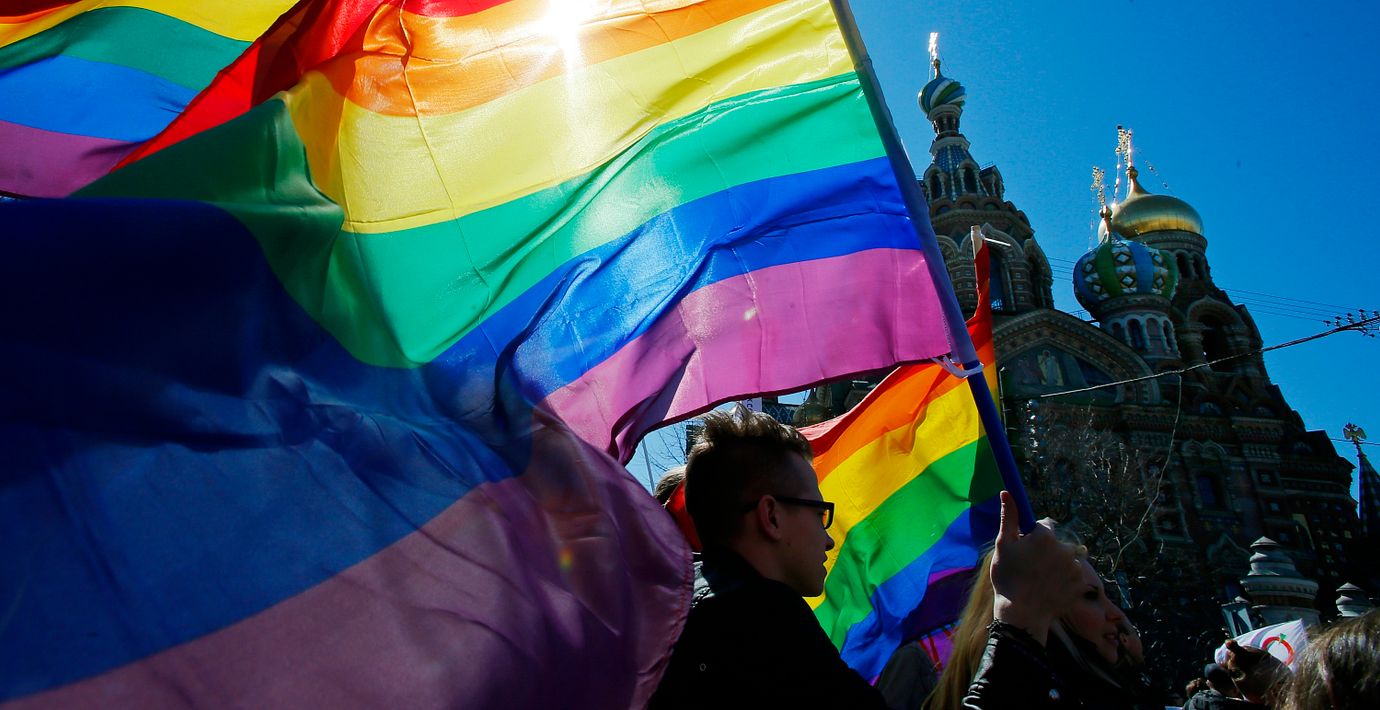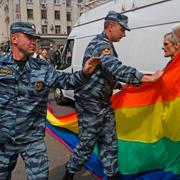
Chefer på rysk hbtq-vänlig bar terrorklassas
Diana Kamilianova och Alexandre Klimov som drev den hbtq-vänliga baren Pose i ryska Orenburg har klassats som ”terrorister och extremister” av ryska myndigheter, rapporterar AFP.
Tidigare den här månaden slog polisen till mot baren och videos visade hur både besökare och anställda trakasserades. Kort därefter kom beskedet att Kamilianova och Klimov gripits.
I november klassade ryska högsta domstolen hbtq-rörelsen som ”extremistisk”, vilket i praktiken förbjuder rörelsen.
Rättsfallet mot barcheferna väntas bli det första som tar avstamp i högsta domstolens beslut. De åtalas för ”extremism” och ”främjandet av icke-traditionella sexuella relationer”. Om de döms riskerar de tio års fängelse.
bakgrund
Hbtq-personers rättigheter i Ryssland
Wikipedia (en)
Lesbian, gay, bisexual, and transgender (LGBT) people in the Russian Federation face significant challenges not experienced by non-LGBT residents. Although sexual activity between consenting adults of the same sex is legal, homosexuality is disapproved of by most of the population and pro-LGBT advocacy groups are deemed extremist and banned. It is illegal for individuals to "promote homosexuality" and same-sex couples and households headed by same-sex couples are ineligible for the legal protections available to opposite-sex couples. Russia provides no anti-discrimination protections for LGBT people and does not have a designation for hate crimes based on sexual orientation and gender identity. Transgender people are not allowed to change their legal gender and all gender-affirming care is banned. There are currently no laws prohibiting discrimination based on gender identity or expression, and recent laws could be used to discriminate against transgender residents.
Russia has long held strongly negative views regarding homosexuality, with recent polls indicating that a majority of Russians are against the acceptance of homosexuality and have shown support for laws discriminating against homosexuals. Despite receiving international criticism for the recent increase in social discrimination, crimes, and violence against homosexuals, larger cities such as Moscow and Saint Petersburg have been said to have a thriving LGBT community. However, there has been a historic resistance to gay pride parades by local governments; despite being fined by the European Court of Human Rights in 2010 for interpreting it as discrimination, the city of Moscow denied 100 individual requests for permission to hold Moscow Pride through 2012, citing a risk of violence against participants. In 2016, Russia was rated the second least LGBT-friendly nation in Europe by ILGA-Europe.In December 1917, after the October Revolution, the Russian Soviet Republic (later the Russian SFSR) decriminalised homosexuality. However, the Soviet Union under Joseph Stalin would later recriminalise sex between men in March 1934 with the addition of Article 154-a to the Soviet criminal code, which punished consensual anal sex between men with three to five years' imprisonment. The revised criminal code of 1961 continued to classify sexual relations between men as a crime, relocating it to Article 121 and providing for only a maximum of five years' imprisonment for consensual sex. Western observers estimated that, during the Soviet era, between 800 and 1000 men were imprisoned per year under Article 121. After the dissolution of the Soviet Union, homosexual acts between consenting males were re-legalised in 1993 (they had not been criminalised for women), removing Article 121 from the RSFSR penal code.Since 2006, under Vladimir Putin, regions in Russia have enacted varying laws restricting the distribution of materials promoting LGBT relationships to minors; in June 2013, a federal law criminalizing the distribution of materials among minors in support of non-traditional sexual relationships was enacted as an amendment to an existing child protection law. The law has resulted in the numerous arrests of Russian LGBT citizens publicly opposing the law and there has reportedly been a surge of anti-gay protests, violence, and even hate crimes. It has received international criticism from human rights observers, LGBT activists, and media outlets and has been viewed as a de facto means of criminalizing LGBT culture. The law was ruled to be inconsistent with protection of freedom of expression by the European Court of Human Rights but as of 2021 has not been repealed. In 2022, the law was extended to apply to anyone regardless of age, thus making any expression deemed a promotion of non-traditional sexual relationships illegal.In a report issued on 13 April 2017, a panel of five expert advisors to the United Nations Human Rights Council—Vitit Muntarbhorn, Sètondji Roland Adjovi; Agnès Callamard; Nils Melzer; and David Kaye—condemned the wave of torture and killings of gay men in Chechnya.Since the Russian invasion of Ukraine, the authorities have stepped up reactionary measures, particularly against trans people. On 24 July 2023, President Putin signed into law a bill banning gender-affirming care in Russia.On 30 November 2023, the Supreme Court ruled the international LGBT movement to be extremist, outlawing it in the country. The next day, Russian security forces raided bars, male saunas and nightclubs across Moscow. On 22 March 2024, the Supreme Court of Russia declared the international LGBT movement to be a terrorist organization.
Omni är politiskt obundna och oberoende. Vi strävar efter att ge fler perspektiv på nyheterna. Har du frågor eller synpunkter kring vår rapportering? Kontakta redaktionen


